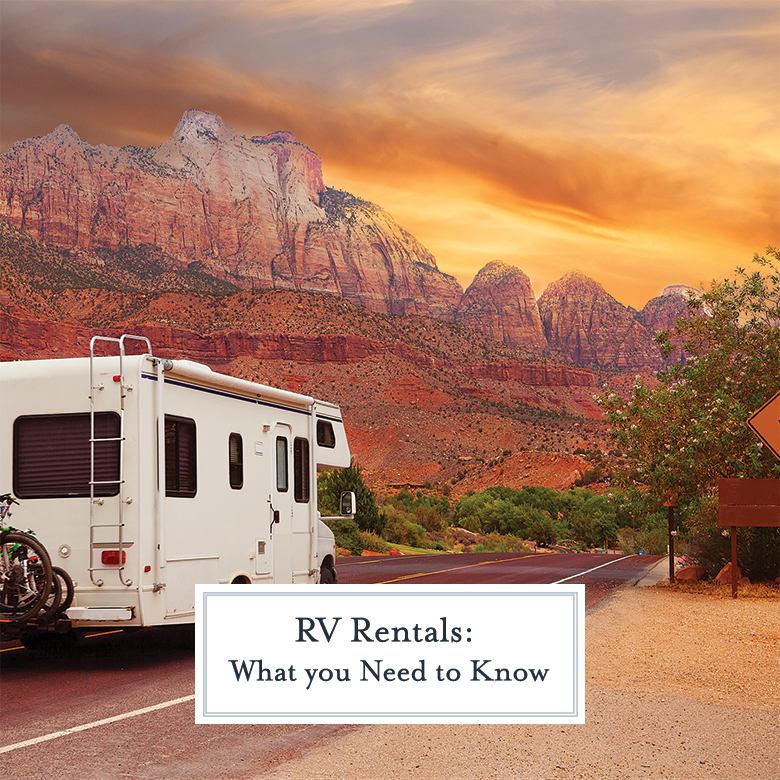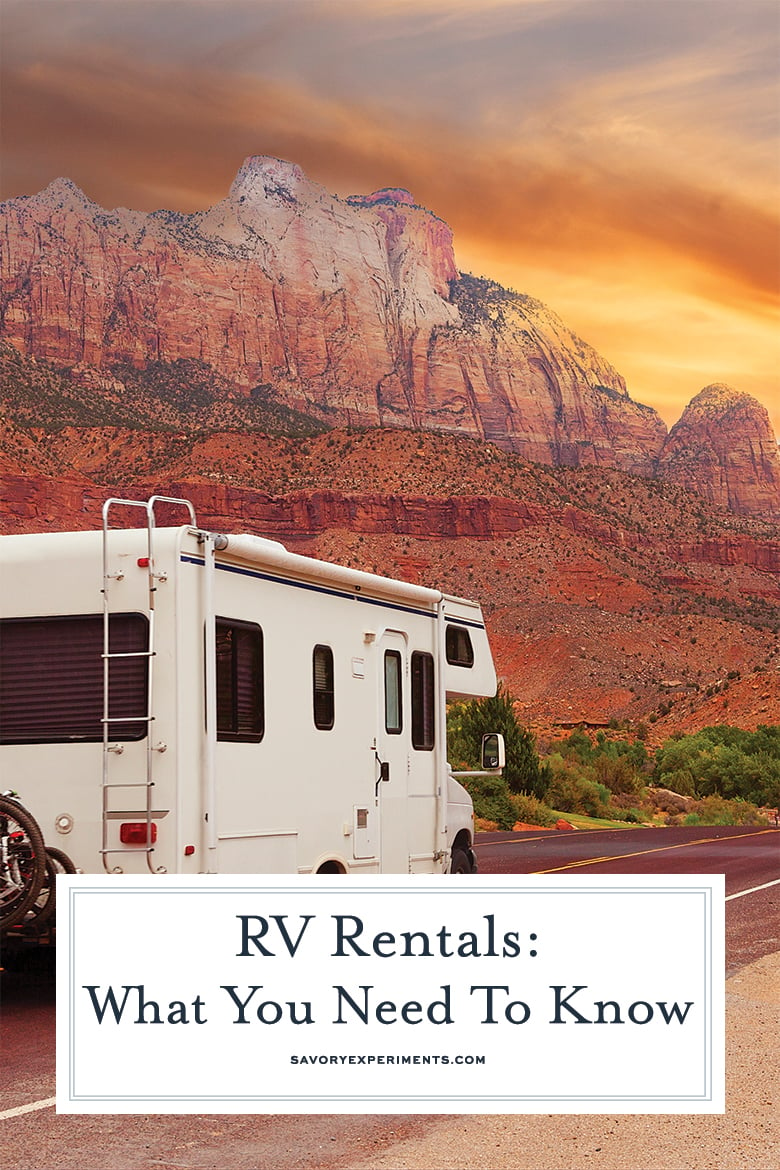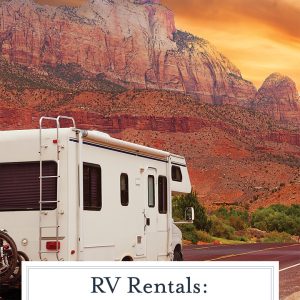If you are like many, your summer plans just got stomped on, thrown out the window and then flew away with the wind. Even though we all want to stay safe, there is still an inherent desire to get out of the house and explore.

Spending quality time with the family is debatable considering we’ve all been cooped up together for months on end. Just kidding… family time is always important.
Family Vacation in an RV
One of the ways in which travelers and families have decided to still travel is by RV, which stands for Recreational Vehicle. While most of us aren’t running out to buy an RV on a whim (unless you previously owned one), many are renting them.
But there are several things to consider, or at least be aware of, before renting an RV for the first time. Myself included, we are still debating whether this is the vacation for us or if we are better off calling 2020 the year that never happened and waiting until 2021.
One thing is for sure, I’ve always been focused on travel outside the US and after doing all of this research, I have a rediscovered appreciation for all of the beautiful destinations right here in the US. Visit our ultimate guide of RV destination locations to get some inspiration.
Before you Go
Before you even get online to start planning your dream road trip, familiarize yourself with RVs, proper etiquette and safety. There are courses available online to give you a crash course in RVing, which is considered to be a whole lifestyle.
Plan the route and make sure there are even campsites available and they can accommodate the your rental RV or camper. Also be mindful of the streets and roads you plan to use. These vehicles are a lot wider than your standard car so the narrow streets of an old town might not be the route you want to take. See the apps available to help you plan below.
Know that there are different sizes of RVs and campers broken down into Class A, B and C. A luxury Class A might even require a special driver’s license according to travel expert Jonathan from Crow Survival. You can get a towable camper, but will also need truck capable of towing the weight.
Lastly, make a checklist and start planing 2-4 weeks before you leave in case you need to order any items.
Pricing It Out
The actual cost of an RV or camper rental can be less or just the same as renting a hotel room and airfare. Some campsites might also require a nightly fee, especially if you require water or electricity hookups.
How much does it cost to rent an RV? A small trailer will run you about $50 per night, but larger luxury campers can be up to $300 per night. Of course there are many options between. Also take into consideration the cost of gas and campsites.
However, Jason from The Getaway Couple suggest looking for free campsites in public lands like State Parks and US Forest Service areas. They can be limited to 10-14 nights, but that is ample time to cover one of these destinations.
After choosing a RV and road trip route, Dave from Go Last Minute RV Rentals try to estimate mileage and gas usage. While some of the other costs might be lower, the gas bill will probably be a lot higher than you expected. Also be map out gas stations along the way that can accommodate larger vehicles.
David from Go RV Rentals also suggests asking about the cancellation policy and making sure things like a pandemic or illness are covered for refund or at least partial refund.
Then there is the stuff you will need. If you’ve never done it before, the purposes just to be RV ready can be a little intimidating. Here is the RV checklist I put together for newbies, curated by full timers and professionals in the industry.
Driving
It can’t be that different, can it? YES!
An RV or camper is quite different than driving your regular vehicle even if that vehicle is an SUV. Practice and become accustomed to taking turns, braking time and other considerations before loading the whole family aboard.
Also know that RVs don’t drive as fast, so account for that in your drive time. It can take twice as long to reach a destination than in a regular car.
Some rental agencies will offer a crash course in driving and the features of your rental. Take them up on this offer and ask questions!
Park It Likes Its Hot
I don’t know about you, but I am fine driving a large vehicle in a straight line. Turns and parking are a whole other story. This goes hand in hand with planning your route and learning to drive, you need to make 100% sure there is parking at your destinations.
Michael from RVBLogger stresses that some of the places you want to visit might not have parking to accommodate large vehicles. You can, however, look into parking at a campsite and then taking an Uber to and from some of these locations. Think about grocery stores and restaurants.
Research and call ahead for things like amusement parks and historical sites and as Alex from Upgraded Points points out, any cities.
Popular tourist destinations may have shuttle service or golf cart rentals. Having bicycles or scooters is another option.
Pack it ALL
Much like camping, you’ll need to anticipate all of the comforts of home, but in your camper. Karen from The Mom Trotter suggests asking the rental company about small appliances in the kitchen, down to having a coffee maker or even grill. Some don’t even have utensils. Make sure they can offer these things, especially if you are going to a destination and then renting the RV.
Also ask about a generator. If you are going to campsites with electricity and you want the amenities of home (or air conditioning) you’ll need one of these. Generators are quite loud, so also take that into consideration.
Karen also encourages you to inquire about linens and towels. Some companies will provide these for an extra charge per person, per bed or per item. It is another cost to consider if you don’t plan to bring your own.
Becca , a full-time RVer, encourages first timers to plan meals and food storage ahead of time. Even a luxury bus will have a substantially smaller fridge and freezer than home. If you plan to eat in the RV, be mindful of items that will require refrigeration and others that are shelf stable, like tuna sandwiches, pancake mix, peanut butter and jelly, and some classic mac-and-cheese. Think canned and dry items. You can always stop at a grocery store along the way (as long as you can park in the back).
Pets
One of the biggest benefits of RV travel is being able to bring your pet. From the family goldfish bowl to the dog, just bring them aboard!
But there are a few things to consider. Make sure you know that all the campsites and locations are pet friendly. If you plan to visit attractions, you’ll need a plan for leaving your fury (or scaled) friend in the RV. Think about the heat and safety of the animal.
Bring all their comforts of home. You don’t know how they’ll react in a new environment… especially when you leave them alone in it. Bring their leash, bed, food and toys to make them comfy too.
Your RV rental service will charge an extra deposit for pets and others don’t allow them at all.
Kids on an RV
To some, the benefit of RV travel is being able to roam around while on the road. NOPE.
This is not safe! Pets, kids, adults- anything not totally nailed down is going to rattle around that metal tube should even the slightest of accidents happen.
Every state has different laws pertaining to seatbelts, but all of them are required for the two front passengers. Some are mandatory for backend passengers, but they are usually only lap belts.
Make sure your kids are properly strapped into their car seats while the RV is in motion. Do not install safety seats into side facing seats or belts. This includes infants that might need to be fed or changed. It isn’t worth the risk!
There are also travel harnesses for older kids. I’ve heard of people using them on airplanes and in Ride Shares, but they can also be used on an RV.
The Stuff We Don’t Want to Think About
Yep, insurance. Whether you’ve purchased an RV or are just renting, you need to make sure you are insured and chances are your current policy doesn’t cover a rental.
Paul, from American Adventure Insurance, suggests you look into Total Loss Replacement Insurance, Unlimited Towing and Roadside Assistance and also how to lower your cost based on geographic location, storage and amount of time being used.
The next item you don’t want to think about is septic. In the RV world this is called Grey Water. There are toilet tank chemicals you will need to treat the septic system and depending on how long you are gone and what rental service you use, it will need to be emptied.
We can’t all be cousin Eddie in our robes screaming “sh*tters full” into the neighborhood sewer.
There is an App For That
Surprising at first, but then pretty understandable, Sagar from Alpha Ragas suggested that there are RV apps that provide detailed information on travel plans, routes, camp sites and more. Some of the most recommend are:
- Roadtrippers
- Roadside America
- CoPilot GPS



















